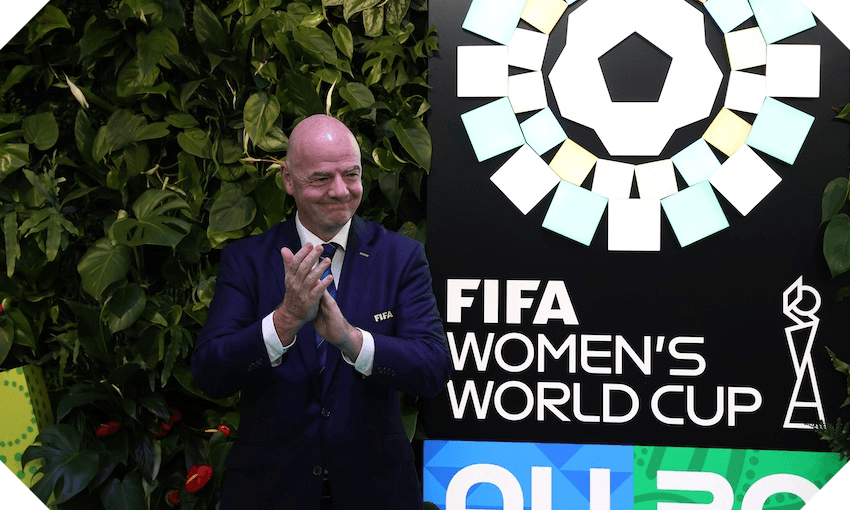Why wasn’t the public consulted before New Zealand bid to host the Fifa Women’s World Cup, asks Mijail Linares.
On the world stage, New Zealand has a reputation for progressive social policies. We are a society that cares deeply about gender equality, diversity, inclusion and human rights. It’s troubling then that the decision to host the Fifa Women’s World Cup 2023 (FWWC2023) was made without public outreach or consultation, given the recent controversies clouding the governing body.
While it’s easy to get lost in the excitement of a football tournament, it’s important to remember the larger context in which it’s happening and the issues that must be addressed. For decades, Fifa has been involved in various scandals and controversies that have tarnished the game’s integrity – money laundering, corruption, discrimination, and human rights violations. The organisation has even come under fire from Amnesty International and Human Rights Watch for its failure to meet its human rights obligations in Qatar. Unfortunately, it appears the upcoming FWWC2023 is not going to avoid this trend.
The Australian and New Zealand Human Rights Commissions conducted an independent human rights risk assessment of the FWWC2023. The report identified 57 risks, 25 of which were deemed tier 1 risks, the most serious of three tiers, based on their severity, scale and likelihood of them arising. They include gender and sex discrimination due to lack of pay parity, exploitation of workers in the cleaning and hospitality industries, exclusion and marginalisation of indigenous peoples, and racial abuse and harassment.
In line with the UNGPs (UN Guiding Principles on Business & Human Rights) and Fifa’s own human rights policy, Fifa has a responsibility to protect the human rights of people from the actions of its commercial affiliates. Fifa responded by publishing a Sustainability Strategy, full of captivating visuals and punchy slogans such as “watershed moment for women’s football” and “a tournament of firsts”, but it fell tremendously short in terms of outlining concrete steps to mitigate the potential risks. This lack of actionable measures leaves doubts about their commitment to human rights.
The UNGPs on Business and Human Rights expect that business enterprises, such as Fifa, will use their leverage and influence to encourage their business partners and associates to remediate harms directly linked to their operations, products, services, or business relationships, even if they did not cause or contribute to the harm. However, Fifa’s own regulations conflict with this policy. According to Fifa’s disciplinary code, players and federations may face disciplinary action for “using a sports event for demonstrations of a non-sporting nature,” effectively silencing any dissent.
In Qatar, a country that criminalises same-sex relationships, many teams playing in the World Cup wanted to wear rainbow armbands as a message of solidarity with the LGBTQIA+ community. Fifa quickly clamped down on them, citing the organisation’s regulation on equipment such as armbands, and banned players from wearing them. During a warm-up for the Qatar World Cup qualifying match, Norwegian players wore shirts that read “Human Rights. On and off the pitch”. And German players covered their mouths during their opening Qatar World Cup match, the message was clear: “Fifa is silencing us”.
While Fifa’s commitment to human rights and gender equality remains in question, their unequal distribution of prize money between men and women’s football World Cups is one clear example of their discriminatory practices. Admittedly, it’s encouraging to hear that the prize money for the FWWC2023 will increase by 300%, but that is still around 10 times less than the men’s prize money.
Of course, the problem with how prize money is split is that it’s completely arbitrary. A report from the Wall Street Journal revealed that Fifa cannot accurately determine the exact revenue earned by the women’s tournament because they sell the broadcasting rights for both tournaments as a package. But as Women’s football has surged in popularity, Fifa has announced its “intention” to have equal payments for the 2026 men’s and 2027 women’s World Cups, though only time will tell if they follow through with it.
Despite the identified risks and controversies surrounding the FWWC2023, New Zealand Football (NZF) chose to submit a bid to host the tournament, citing its desire to use the tournament as a platform for profound social impact, grow football in the region and unlock new commercial returns. However, despite the growing push for equal pay in women’s sports, NZF did not advocate for equal prize money in their bid and failed to address the issue in any other way.
Additionally, NZF’s recent history for fostering a “toxic team culture” of bullying and harassment is troubling, given the identified human rights risks associated with the tournament. As one of the host nations, NZF has a responsibility to ensure that the FWWC2023 is conducted in a way that aligns with New Zealand’s values of diversity, equality and inclusion. Their failure to address those issues raises doubts about their commitment to these values and their ability to promote social justice on a global stage.
It’s worth noting that the issue of sports governing bodies submitting bids without public consultation is not unique to NZF and the FWWC2023. New Zealand Major Events is the go-to government organisation for sports’ governing bodies seeking organisational and financial support to submit a bid. For the FWWC2023, New Zealand Major Events commissioned a cost-benefit analysis report (released under an OIA request) to determine if it should support NZF for the bid. However, the report made no mention of human rights issues or Fifa’s reputation, focusing solely on the monetary value of the event. This lack of consideration for human rights and social impact is troubling and raises concerns about the accountability of sports governing bodies and how public funds are being allocated.
Furthermore, a meta-evaluation report, commissioned by New Zealand Major Events, looked at evidence from the last 18 events to understand the logic and rationale for their organisation to support major events and found that “it is clear that insufficient attention has been given to accurately describing and sizing any social and cultural impacts, or longer-term legacy benefits.” The report highlights the need for greater consideration of social and cultural impacts, which are an essential aspect of hosting major events that will have a lasting impact on the community. Despite this the New Zealand government has already committed $50 million dollars to the event, not including local government expenses. The report makes recommendations to ensure that robust measurements of cultural and social benefits are considered when investing in an event, but then shifts the burden of responsibility back to the organiser.
As consumers and fans, we hold immense power in shaping the practices of the sports industry. Just as we carefully choose which products and brands to support based on their values and ethical practices, we should be afforded the same opportunity to decide how, when and if we host an international sporting event. We can demand greater action from organisations like Fifa, NZ Football and New Zealand Major Events to address issues like gender equity and human rights abuses. If the proposed sports event doesn’t align with our values, we should have the courage to withdraw our support, just like we would with our everyday shopping.



